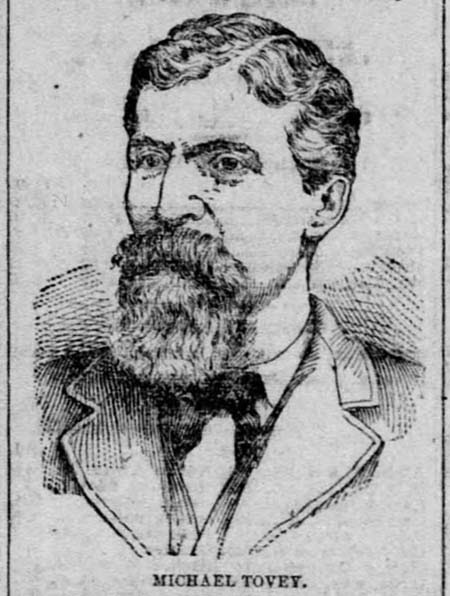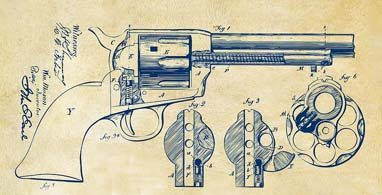It was June 15, 1893 on a remote stretch of road outside Jackson, California. Mike Tovey was again riding shotgun as security guard for Wells Fargo, this time aboard the stage headed from Ione into Jackson. Mike had been shot once before in his dangerous career; no doubt his eyes were always scanning the countryside for possible trouble.

But as the stage crested Morrow Grade that fateful day, the vista was open — not the sort of territory where a concealed highwayman would be expected. And that’s exactly when a man clad in blue coveralls stepped out from behind a small clump of buckeye bushes — and, without warning, fired directly at the stage.
Tovey toppled forward. A bullet had ripped its way through his heart. Fearless Mike Tovey, “one of the strongest, biggest and most cheerful shotgun messengers in the employ of the Wells Fargo Express company that ever rode through the lonely mountain passes of the Sierras,” was dead.

Suspicion promptly centered on Milton Sharp, of course — Tovey had been instrumental in sending Sharp to Nevada State Prison for a series of Bodie stage robberies in 1880. After several failed attempts to escape Sharp had finally successfully broken out of prison in 1889, and had been running from the law for four years before Tovey was shot. Rumor was that Sharp had sent threatening letters to Tovey — or at least someone had, using Sharp’s name.
The hunt for Milton Sharp was on. He was soon captured in Red Bluff, California by a sharp-eyed police officer who recognized his “wanted” picture.
But somehow the sweet-talking bandit managed to convince authorities he wasn’t the one responsible for Tovey’s killing. And although he still had a sentence to serve for his original stage robberies, Sharp had by now served nearly half his original twenty-year sentence. He managed to talk Wells Fargo into recommending a pardon for this earlier crime, claiming he’d become “rehabilitated” during his years on the run. Sharp won a formal pardon in 1894 and was released. For the rest of his life he remained on the right side of the law — or so they say, anyway.
So . . . Sharp wasn’t convicted of Tovey’s murder. Instead, a petty criminal named Bill Evans confessed to the crime. Well, he offered up a confession to it. Modern lawyers would cringe to hear that he did so without benefit of having a lawyer present. Evans would later say he’d been drugged and set up by an over-eager sheriff and a cooperating stool pigeon.

Even the press expected a “not guilty” verdict when Evans finally came to trial, due to the large volume of what the newspapermen carefully termed “conflicting evidence.” None other than Wells Fargo’s own detective was convinced that Evans was not guilty.
It took two criminal trials. But three hours into deliberations following the second trial, a jury finally voted to convict. Evans was sentenced to spend the rest of his life in prison — for a murder he may or may not have committed.
So did Evans really shoot Tovey? Or did Sharp, Tovey’s long-time enemy, not only exact revenge for sending him to prison but also get away with murder?
And one other mystery: whatever happened to Milton Sharp’s robbery loot? Treasure-hunters are convinced that Sharp and his partner must have buried a good bit of their treasure. Estimates of how much was taken during the pair’s estimated 20 stage robberies vary. Some say it came to $6,000 (in 1880 dollars); others claim it could have been even more.
Small portions of the loot were said to have been found in 1910 by a pair of treasure-hunting brothers named Hess. Wouldn’t we all love to know where the rest might still be hiding.
P.S. We hope you’ll pay a visit to Mike Tovey’s grave if you’re ever at the Jackson City Cemetery. It’s close to Zacharius Kirkwood’s tall monument which has a ball on top.

(If you missed Part 1 of this story — the robbery of the Bodie stage that sent Sharp to prison — just click here.)
____________
Enjoyed this story? We’d love it if you leave us a comment below! And feel free to share on Facebook!
Like to read more Sierra history stories like this, hot off the presses, as soon as they come out? Sign up for our free history newsletter at the top right of this page!
#AmadorCounty #History #SierraHistory #cemetery

[…] of the most famous is Mike Tovey, who from 1871 to 1893 worked the stage lines in multiple territories, from Montana to California. […]